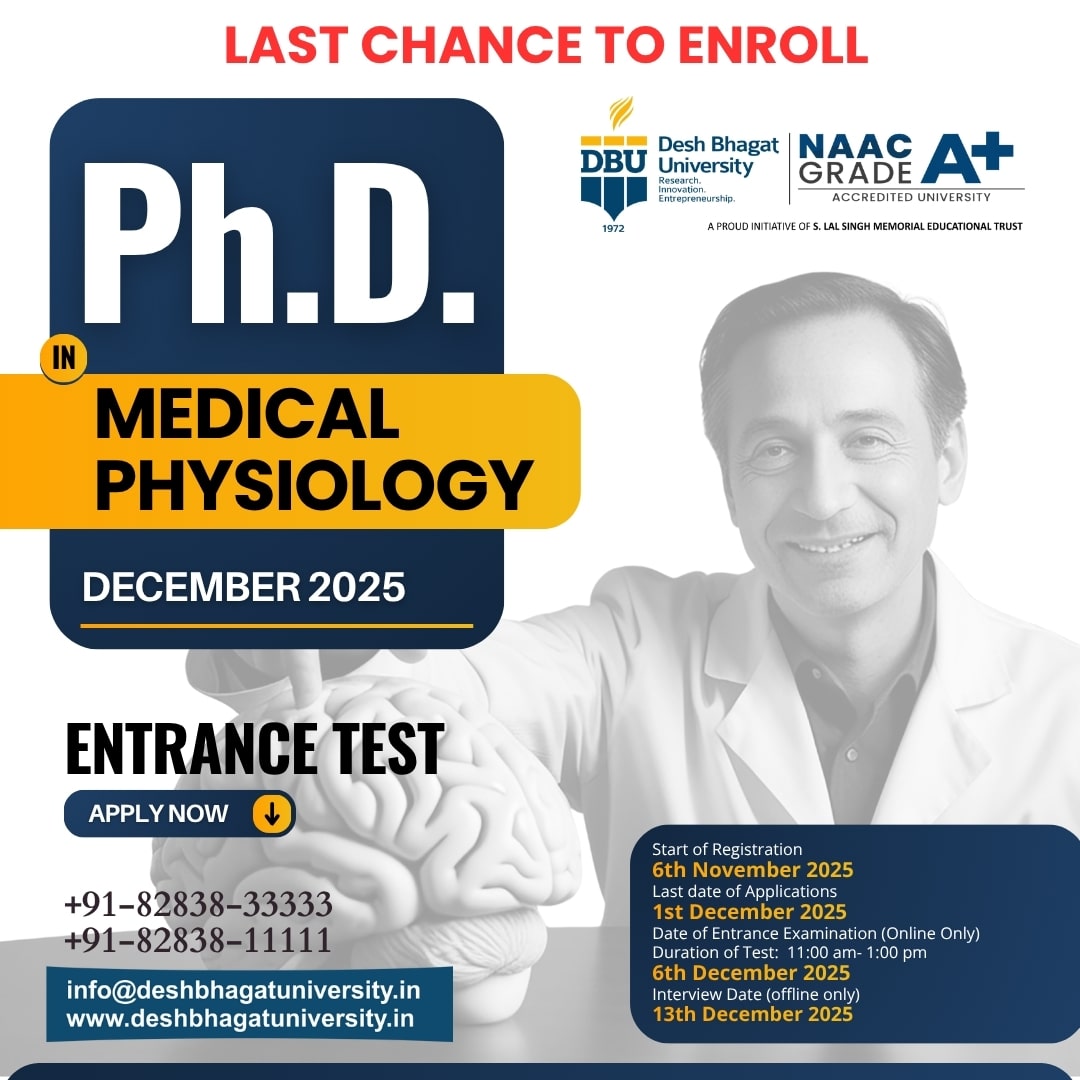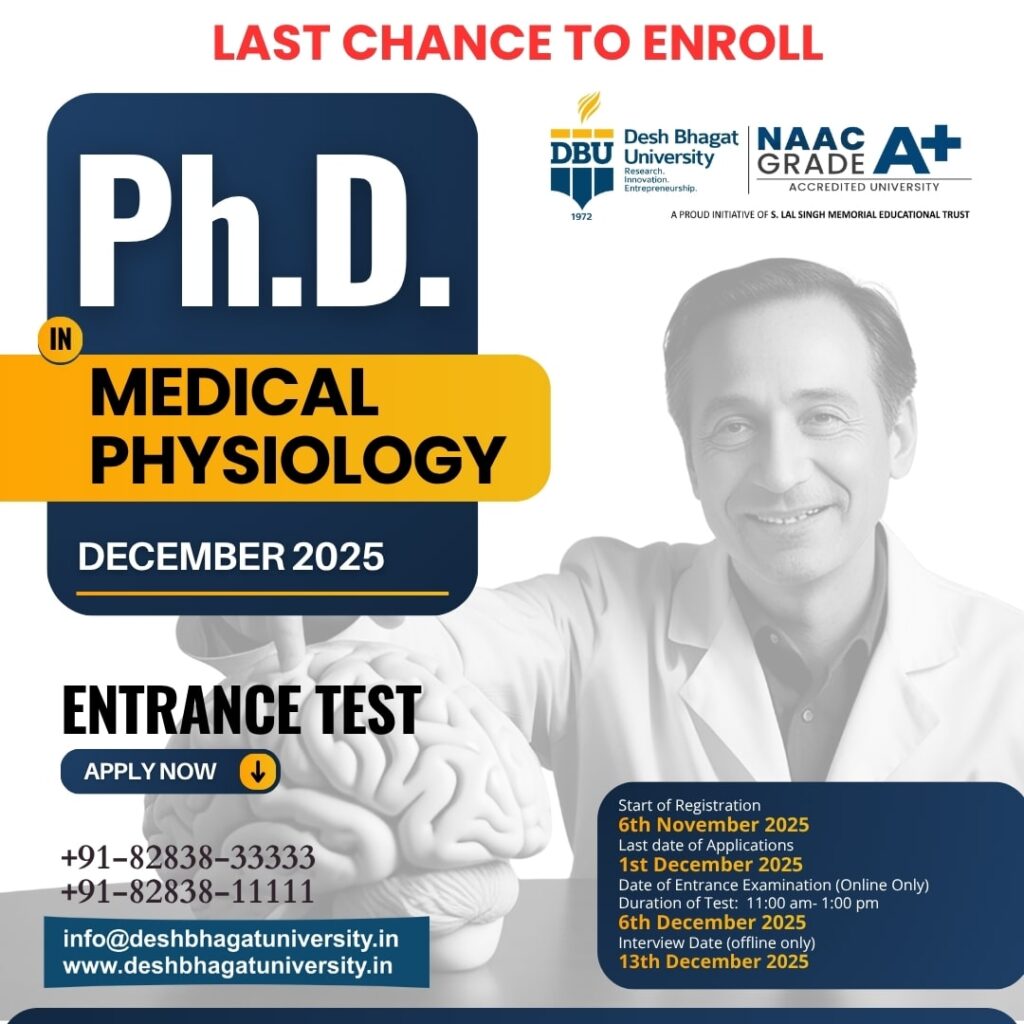PhD in Medical Physiology in India: Eligibility, Career, Admission 2026
July 16, 2025 2025-11-06 8:18PhD in Medical Physiology in India: Eligibility, Career, Admission 2026

PhD in Medical Physiology in India: Eligibility, Career, Admission 2026
Are you interested in understanding how the human body functions? Do you want to make a difference in medical science and help improve healthcare? A PhD in Medical Physiology could be the ideal choice for you. At Desh Bhagat University (DBU), this program provides detailed knowledge and research opportunities to explore the various functions of the human body.
In this article, we will explore everything you need to know about the PhD in Medical Physiology at DBU, including its structure, eligibility, admission process, and career opportunities.
What is a PhD in Medical Physiology?
A PhD in Medical Physiology is an advanced research degree focused on studying the body’s various physiological processes. Physiology is the branch of biology that deals with how organs, tissues, and cells in the body function and how they respond to diseases or other changes.
A PhD in Physiology goes beyond just understanding the human body’s systems—it helps you discover new aspects of how these systems work. Some key topics that are explored include:
- Cardiovascular Physiology: This includes the study of the heart, blood vessels, and blood circulation.
- Neurophysiology: This focuses on understanding the brain, spinal cord, and nervous system functions.
- Renal Physiology: It looks at the kidneys and their role in maintaining fluid and electrolyte balance.
- Endocrine Physiology: This examines how hormones regulate various body functions.
- Respiratory Physiology: Studying the lungs and gas exchange that helps with breathing.
In this program, you will not only learn theory but also engage in hands-on research to explore how these systems impact human health.
About Desh Bhagat University (DBU)
Desh Bhagat University (DBU), located in Mandi Gobindgarh, Punjab, India, is a well-known private university that provides excellent education. The university has a reputation for providing a supportive learning environment with modern facilities. It offers a variety of programs across multiple disciplines, including medical sciences, engineering, law, and humanities.
DBU stands out for its research-oriented approach, especially in fields like medical physiology, where students have the opportunity to engage in ground-breaking studies. The faculty at DBU is highly qualified, providing students with expert guidance in their academic and research endeavours.
Program Structure and Duration
The PhD in Medical Physiology program at DBU is designed to equip students with the tools they need to perform high-level research in the field of physiology. It typically lasts a minimum of three years and a maximum of six years.
Key Phases of the Program:
Coursework Phase:
- In the first year of the program, students will complete foundational courses that are critical to conducting quality research. These courses will cover research methodology, functional English, computer applications, and basic principles of physiology.
- These courses are designed to help students develop strong research skills and a clear understanding of the body’s functions.
Research Proposal:
After completing the coursework, students must prepare a research proposal. This proposal should outline the research questions they aim to explore, the methods they plan to use, and how their work could contribute to the field of medical physiology.
Once the proposal is submitted, it is reviewed by the research committee. If approved, the student can proceed with their research work.
Research Phase:
- In this phase, students will conduct original research based on their proposal. They will work closely with faculty supervisors to explore various physiological processes, experiment with hypotheses, and analyze data.
- Research can involve experiments on human physiology, animal models, lab work, or data collection from healthcare settings.
Thesis Submission:
- Once the research is complete, students will compile their findings into a thesis. This document will describe the research process, data analysis, and conclusions.
- The thesis is then submitted for evaluation. A successful thesis is a requirement to obtain a PhD degree.
Viva Voce (Oral Defense):
- The final stage of the PhD program involves defending the thesis before a panel of experts. The student presents their research findings and responds to questions and critiques from the panel.
- If the student successfully defends their thesis, they will be awarded a PhD in Medical Physiology.
Eligibility Criteria for PhD in Physiology
To be eligible for admission to the PhD in Medical Physiology program at DBU, candidates must meet the following requirements:
- Educational Qualifications:
- A Master’s degree in Medical Physiology or a related field with at least 55% marks (or an equivalent grade) from a recognized university.
- If you have a background in biomedical sciences, life sciences, or healthcare and are interested in physiology, you may also be eligible to apply.
- Entrance Exam:
- Candidates must qualify the PhD Entrance Test (PET) conducted by DBU or have a valid score in national-level exams such as UGC NET, CSIR NET, or GATE. This ensures that candidates have a strong understanding of research principles and medical physiology before entering the program.
- Interview:
- Shortlisted candidates will be invited for an interview where they will present their research interests and discuss their educational background.
- This interview helps assess the candidate’s passion for research and their understanding of physiology.
Admission Process for PhD in Medical Physiology at DBU
The PhD admission process at DBU is straightforward and involves two main stages:
- Stage I: Entrance Test
- Registration Period: From July 9 to July 28, 2025.
- Test Date: August 2, 2025 (Online).
- Stage II: Interview
- Date: August 9, 2025.
After completing these stages, the final selection is made based on performance in both the entrance exam and the interview.
Career Opportunities after a PhD in Medical Physiology
Upon completing a PhD in Physiology, graduates can explore a wide range of career options, including:
- Academic Roles:
- PhD graduates can become professors or lecturers in medical colleges and universities, teaching physiology to medical students and guiding their research projects.
- Medical Research:
- Many PhD holders in physiology work in research institutions or labs, where they explore new therapies, investigate disease mechanisms, or contribute to developing medical technologies.
- Healthcare and Clinical Roles:
- Knowledge of physiology is highly valuable in healthcare settings. PhD holders can work as clinical physiologists in hospitals or health centers, diagnosing and treating various conditions related to the body’s physiological systems.
- Pharmaceutical and Biotechnology:
- Pharmaceutical companies often hire physiology experts to help develop new medications, perform clinical trials, or conduct research in drug development.
- Forensic Physiology:
- Some graduates work in the field of forensic science, using their knowledge of human physiology to assist in legal investigations, particularly in understanding how physiological factors affect death and crime scenes.
Why Choose Desh Bhagat University for a PhD in Medical Physiology?
Desh Bhagat University provides an excellent environment for pursuing a PhD in Medical Physiology. Here’s why DBU stands out:
- Experienced Faculty: DBU boasts a team of experienced faculty members who are experts in medical physiology and research.
- State-of-the-art Facilities: The University has modern laboratories, libraries, and equipment to support your research.
- Research Opportunities: DBU encourages innovation, and students have the chance to work on cutting-edge research projects that contribute to the field.
- Global Exposure: DBU has international collaborations with research institutions, providing students with the opportunity to participate in global research activities.
Important Dates for PhD Admission (August 2025 Session)
- Online Registration: July 9 – July 28, 2025.
- Entrance Exam Date: August 2, 2025.
- Interview Date: August 9, 2025.
- Fee Payment Deadline: August 18, 2025.

How to Apply
- Visit DBU’s official website page (https://www.admissions.deshbhagatuniversity.in/) to access the PhD application form.
- Complete the registration by entering your details, educational background, and research interests.
- Please upload the necessary documents, including transcripts, a research proposal (if applicable), and proof of identity.
- Pay the application fee through the available payment methods.
- Prepare for the entrance exam and attend the interview.
Final Thoughts
Pursuing a PhD in Medical Physiology at Desh Bhagat University opens up numerous opportunities for a successful career in academic, clinical, or research settings. With a strong curriculum, world-class facilities, and experienced faculty, DBU provides an ideal environment for aspiring medical physiologists.
If you are passionate about understanding the human body and making a significant impact in the field of medical science, DBU’s PhD in Medical Physiology program is the perfect choice.
FAQs
1. What is a PhD in Medical Physiology?
A PhD in Medical Physiology is a research-focused degree where you study how the human body works. You’ll explore different systems in the body, like the heart, lungs, brain, and kidneys. It’s about understanding how these systems function normally and how they respond to diseases or injuries, contributing to medical science.
2. What are the eligibility criteria for the PhD in Medical Physiology program at DBU?
To be eligible for the PhD in Medical Physiology at DBU, you need a Master’s degree in Medical Physiology or a related field with at least 55% marks. You must also pass the DBU PhD Entrance Test or have a valid UGC NET, CSIR NET, or GATE score. After that, you’ll attend an interview to discuss your research ideas.
3. How long does the PhD program in Medical Physiology last at DBU?
The PhD in Medical Physiology program at DBU lasts a minimum of three years and can extend up to six years, depending on the research progress. During these years, you’ll go through coursework, research, thesis writing, and the final defense of your thesis.
4. What subjects will I study during the PhD program in Medical Physiology?
The program begins with core courses in research methodology, functional English, computer applications, and basic physiology concepts. As you progress, you’ll focus on specialized subjects like cardiovascular physiology, neurophysiology, renal physiology, and endocrinology, which will help you conduct research in your chosen area.
5. What is the admission process for the PhD in Medical Physiology at DBU?
The admission process involves two main stages:
- Entrance Test: A test covering research methodology, English, computer skills, and subject knowledge. It’s held online and helps evaluate your readiness for research.
- Interview: Shortlisted candidates from the test will attend an interview to discuss their research interests and academic background, and will be selected based on this discussion.
6. Can I apply for the PhD program without taking the entrance exam?
Yes, if you have already qualified in UGC NET, CSIR NET, or GATE, you may be exempt from the entrance exam. However, you will still need to attend the interview where your research interests and potential will be discussed with faculty members.
7. What are the career opportunities after completing a PhD in Medical Physiology?
After earning your PhD in Medical Physiology, you can pursue various careers in academia, research, or healthcare. Many graduates become professors at universities, work as research scientists in labs, or contribute to pharmaceutical companies and hospitals, helping improve medical treatments and technologies.
8. What facilities are available at DBU for PhD students?
DBU provides excellent research facilities for PhD students, including well-equipped labs, access to a library with medical journals, and online resources. You’ll also have opportunities to attend workshops, seminars, and conferences that will help you stay updated with the latest research in physiology.
9. How do I apply for the PhD in Medical Physiology program at DBU?
To apply for the program, fill out the online application form. You’ll need to provide your details, upload educational certificates, and pay the application fee. Once you’ve completed this, you can take the entrance exam and attend the interview if shortlisted.
10. What makes Desh Bhagat University a good choice for a PhD in Medical Physiology?
DBU is a great choice because it offers a research-oriented environment, experienced faculty, and modern laboratory facilities. The university also encourages innovation and provides international collaborations that give students exposure to global research opportunities. This helps students achieve a successful career in physiology or medical research.






